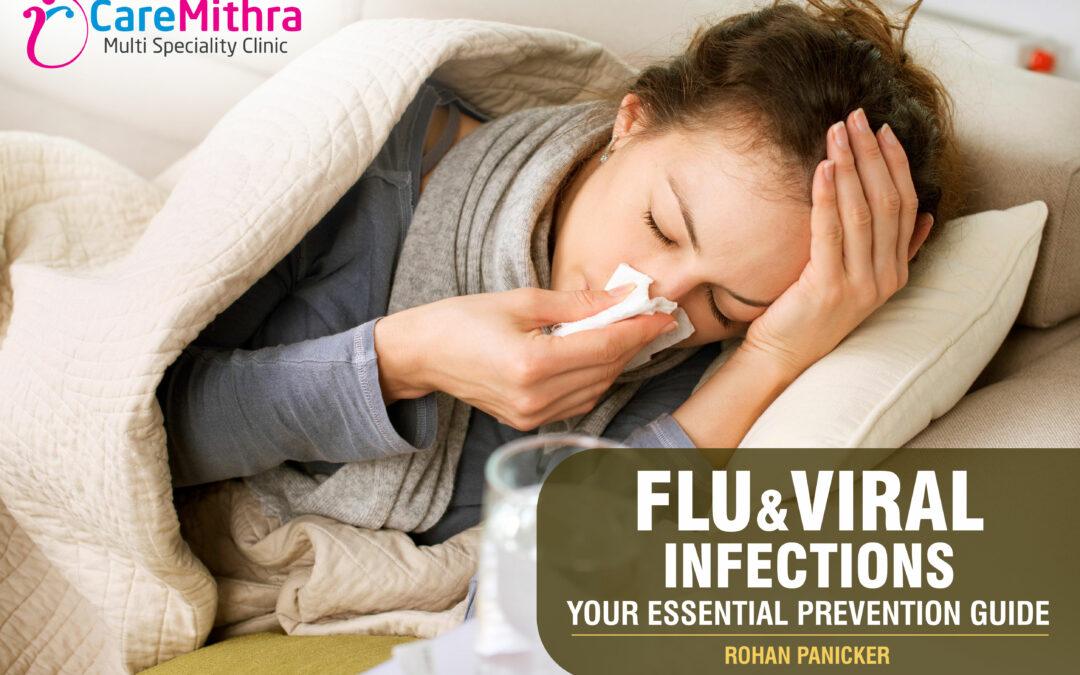The various strains of the flu (Influenza) and other viruses are not only a nuisance with their troublesome symptoms; given the optimal conditions for spreading, they can create public health crises, endemics and even pandemics. Prevention is key to reducing the spread of these infections and safeguarding our well-being and that of our communities. By implementing a mere handful of simple yet effective strategies, we can exponentially reduce the likelihood of falling victim to these viral illnesses. This article will deliver steadfast preventative measures to help you stay healthy and ward off viral infections, particularly the flu.
1. Vaccination: One of the most effective ways to prevent the flu is through annual vaccination. Flu vaccines are designed to protect against the strains predicted to be most prevalent during the flu season. Vaccination not only reduces the risk of getting the flu but also minimises its severity if contracted. It is recommended for individuals aged six months and older, especially those at higher risk, such as young children, the elderly, pregnant women, and individuals with chronic health conditions.
2. Hand Hygiene: Frequent handwashing is an essential habit for preventing viral infections. Thoroughly washing your hands with soap and water for at least 20 seconds helps eliminate viruses that may be present on your hands. If soap and water are not readily available, using an alcohol-based hand sanitizer with at least 60% alcohol content can be a suitable alternative. Be sure to clean your hands before eating, after using the restroom, and after coming into contact with potentially contaminated surfaces or individuals.
3. Respiratory Hygiene: Respiratory hygiene practices can significantly reduce the transmission of viruses, including the flu. When coughing or sneezing, cover your mouth and nose with a tissue or use your elbow if a tissue is not available. Dispose of used tissues immediately and wash your hands afterwards. Encourage others to follow these practices as well. If you experience flu-like symptoms, consider wearing a face mask (ideally N95 or N99 respirator) to prevent the spread of the virus to others. Wearing a face mask is also useful in crowded places or encountering infected individuals during flu season and other endemics as it covers the nose and mouth, key pathogen-entering areas.
4. Avoid Close Contact: Limiting close contact with individuals who are sick can help minimise the risk of viral infections. If you are feeling unwell, stay at home and avoid close contact with others to prevent the spread of the virus. Likewise, if you encounter someone who is visibly ill, maintain a reasonable distance to reduce the chances of exposure. When possible, try to maintain a distance of at least six feet from individuals, particularly in crowded places.
5. Boost Your Immune System: A robust immune system can act as a shield against viral infections. Adopt a healthy lifestyle that includes regular exercise, a balanced diet rich in fruits and vegetables, adequate sleep, stress management, and proper hydration. These habits help strengthen your immune system and improve its ability to defend against the flu and other viral infections.
6. Keep Surfaces Clean: Viruses can survive on surfaces for varying periods, making regular cleaning and disinfection important. Frequently touched surfaces, such as doorknobs, light switches, countertops, and electronics, should be cleaned and disinfected with suitable products. Follow the instructions on the disinfectant for effective use, ensuring that you cover all areas thoroughly.
7. Stay Informed: Stay updated with reliable sources of information, such as those distributed by public health authorities, for accurate and timely guidance on viral outbreaks. Understanding the symptoms, transmission modes, and preventive measures specific to each viral infection can empower you to make informed decisions and take appropriate actions to protect yourself and others.
Preventing viral infections like the flu requires a combination of individual responsibility and community cooperation. By following these preventive measures, such as getting vaccinated, practising proper hand and respiratory hygiene, avoiding close contact with the sick, boosting your immune system, keeping surfaces clean, and staying informed, we can greatly reduce the risk of contracting and spreading viral infections. Embracing these practices not only protects your well-being but also contributes to the collective effort in creating safer and healthier communities.





